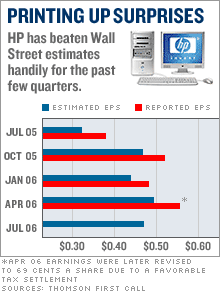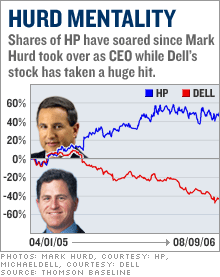|
HP: Printing up big profits Stock Spotlight: Just past a year at the helm, HP's CEO Mark Hurd has put the company back on track. Is the stock still a buy? NEW YORK (CNNMoney.com) -- For years, Hewlett-Packard was going nowhere fast on Wall Street. Though HP dominated the printing market, briefly held the title of No. 1 personal computer maker and expanded its services division, its stock price languished because of lackluster margins and its messy 2002 acquisition of Compaq Computer.
Enter turnaround prince Mark Hurd, who took over from Carly Fiorina, the maligned architect of the Compaq deal, in April 2005. Hurd, who had a reputation as a master of cost cutting from his days as CEO of ATM maker NCR (Charts), quickly went to work to slash expenses at HP. Shortly after he was hired, the company announced it would lay off 14,500 workers - or 10 percent of HP's workforce - in order to boost profits. Under Hurd, HP (Charts) has consistently exceeded earnings estimates, sending its stock up more than 50 percent since he joined the company. But it's not all about cutting costs. In late July, HP said it would spend $4.5 billion to snap up Mercury Interactive, which makes software that helps businesses install and manage their applications over networks. Software is a small but rapidly growing business for HP. HP also has gained ground in the PC market-share battle and has taken advantage of problems facing its top rival, Dell. The company will report its fiscal third quarter on August 16. Analysts expect HP to post revenue of $21.8 billion and earnings per share of 47 cents. But can HP continue its remarkable string of surprises? Emulating Big Blue While HP is mainly known to investors and consumers for being a printer and PC leader, the company sees opportunity for growth in other, potentially very profitable, sectors. The company's services division, which works with businesses to construct and streamline their computer systems, turned in operating margins of nearly 9 percent in the second quarter, second only to the vaunted printing division. Margins actually improved from 7.3 percent a year earlier, even though sales fell 2 percent, as the company walked away from less profitable deals, according to Dan Renouard, an analyst with Baird. The services business has become increasingly important for HP as of late. The division generated 17 percent of HP's total revenue in the quarter. And analysts think HP is in a strong position to expand the business because such a large number of potential services customers already own HP computers, servers and printers. IBM (Charts) made a similar transition in the 1990s, converting its massive base of hardware clients into a host of services clients who signed up to long-term contracts and became a steady source of revenue. IBM also built a sizable software division through acquisitions. HP is trying to be more like Big Blue in that regard as well, and the Mercury deal is the clearest example of this. While the market sent HP shares down on news of the acquisition since HP agreed to pay a 33 percent premium for Mercury, Goldman Sachs analyst Laura Conigliaro said in a research note that she thinks HP made a wise move. She believes HP's software business has long been underdeveloped and that the Mercury acquisition will allow HP to improve its margins significantly. Software currently makes up only 1.5 percent of HP's revenues, but sales grew 20 percent, making it the fastest-growing division year over year in the second quarter. The bread and butter Printers, PCs and servers are still the company's core strengths. Sales from these businesses accounted for 80 percent of HP's revenue in the second quarter. The consumer PC group is the least profitable of the company's divisions because of the intense price competition with Dell and other rivals, but HP has impressed analysts lately by outgrowing its top competitor and the overall PC market. According to tech research firm Gartner, HP's global PC shipments rose nearly 14 percent in the second quarter of 2006, compared to 11 percent growth for the entire market and 11.6 percent for Dell. Printing, of course, remains the company's bread and butter: 60 percent of the company's operating profits still come from that division. And analysts say HP has held up well even as competitors try to take a bite out of HP's sales. The 2002 deal between Dell and printer manufacturer Lexmark (Charts) to make Dell-branded printers was an initial scare for HP, but competition has not been as menacing as investors expected. "HP is still the gold standard, so [competition] is a longer-term threat. In the short term, HP looks very healthy," said said Baird's Renouard. To that end, a Baird study with 50 large businesses found that more than half of them count HP as their main printer vendor and that 70 percent plan to spend the same or more on printing this year than in 2005. Turnaround isn't over Because HP's shares have soared since Hurd took over, it's reasonable to wonder if the company's growth potential is already reflected in the stock price, especially since much of HP's gains have come at Dell's expense. Dell's stock has plummeted during the past year. Yet, HP is currently trading at just 15.9 times 2006 projected earnings. That's cheap compared to Dell (Charts), which trades at 18.9 times earnings estimates for this fiscal year. Investors used to justify Dell's higher valuation by pointing out that it was a much higher-growth company. But HP has evened the score on that count. Over the next five years, analysts expect HP's earnings to grow, on average, 12.8 percent a year, only slightly lower than the projected annual earnings growth rate of 13.4 percent for Dell. Renouard believes there's still a lot of ground to be made up under Hurd's streamlining approach. "We see HP as a long-term turnaround story," he said. And it seems that this story is still in its early chapters. Disclosure: Baird's Renouard does not own shares of HP, but his firm has done investment banking business with the company. Conigliaro does not own shares of HP, but Goldman Sachs has an investment banking relationship with HP. |
|




